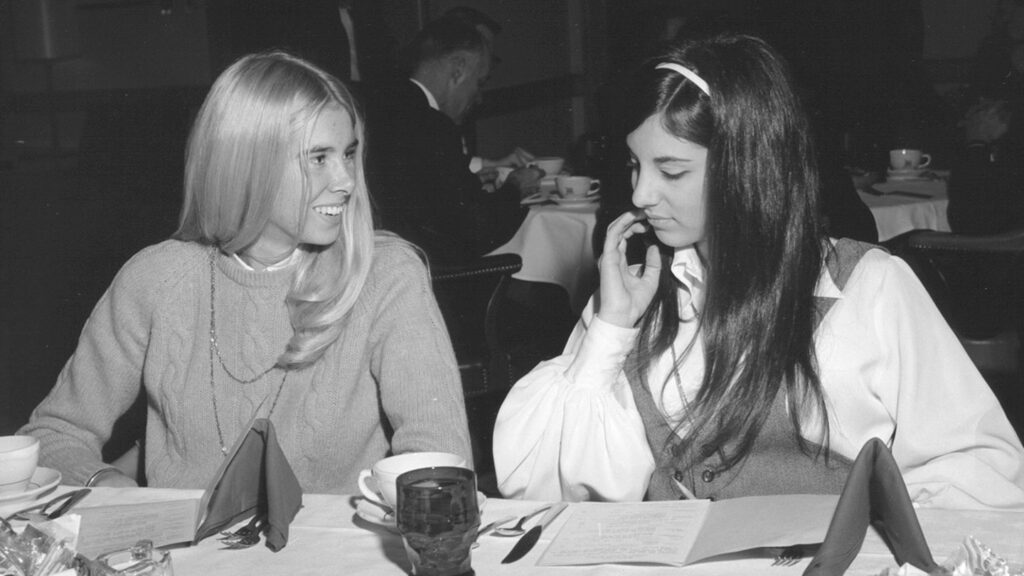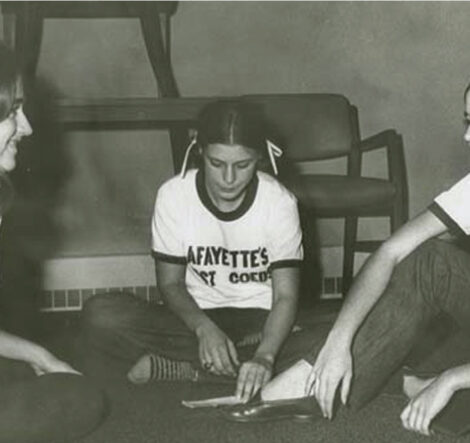By Jill Spotz
On June 27, 1969, after an exhaustive investigation into the “costs that might affect the issue of feasibility of coeducation at the College,” the all-male Lafayette College Board of Trustees passed by a 19-9 vote a resolution mandating that “women be admitted to all programs of the College.” Ralph Gottshall ’27, chair of the Board of Trustees at the time, convinced board members to vote to transition the College to coed. “Therefore, gentlemen, I conclude that the admission of women to Lafayette College is necessary. The key to my thinking is that our role in society is better filled if our doors are open to all students. We should try to be the kind of institution that young people today consider exciting and meaningful and relevant,” said Gottshall during his remarks that day, which would forever change the trajectory of Lafayette.
Starting this fall, Lafayette will commence a yearlong celebration, highlighting the advances of women at the College and their influence on Lafayette, their fields of study, and the world. Over the last 50 years, Lafayette has changed dramatically. Women now outnumber men in the number of students attending (52% women; 48% men), nearly 50% of faculty are women, and the College has added 11 Division I women’s sports. Efforts to promote diversity and inclusivity have resulted in Lafayette’s engineering programs consisting of nearly 40% women. Nearly one-third of full-time faculty members in Lafayette’s engineering programs are women. (That compares to a national average of 13.9%, according to the American Society for Engineering Education.)

In January 1970, 200 women applied to attend the College. Joyce S. Cohen, a senior at Easton Area High School, and Susan L. Trotter, a senior at Rumson-Fair Haven Regional High School, were the first two women to submit their enrollment deposits.
“One aspect of Lafayette I have always admired is how smoothly the College made the transition to coeducation,” says Alison Byerly, Lafayette’s first female president. “Once the vote was taken, there was no looking back, and the immediate positive impact of the women who were admitted proved the wisdom of the College’s decision. Admitting women was a game-changer for Lafayette, expanding the College’s enrollment pool and strengthening the quality of the student body.”
Over the span of 50 years, Lafayette has graduated many female leaders who have demonstrated their ability to innovate, inspire, and manage effectively in every sector of the economy. Among them are Elizabeth A. Mowins ’89 H’18, the first woman to call NFL play-by-play for CBS; Amanda Pisetzner ’10, Lafayette’s first woman graduate to win an Emmy Award; and Laneta Dorflinger ’75 H’17, distinguished scientist and director of product development and introduction at FHI 360 one of the largest international nonprofit organizations in human development with activities in more than 60 countries. To read more about Lafayette alumni, faculty, and staff who represent five decades of hope, change, and tenacity on College Hill and beyond, see Lafayette’s 50 for 50 list.
“Our committee of alumnae, faculty, staff, and students are working to ensure we engage and celebrate the positive impact of coeducation this year,” says committee chair and executive director of Alumni Relations Rachel Nelson Moeller ’88 P’21. “Although some of our events were canceled due to the pandemic, we are planning virtual celebrations to honor this important milestone. We have been actively meeting and planning since fall 2019 and will continue to do so throughout the year to create opportunities for the entire Lafayette community, on campus and off, to celebrate this historic moment.”
Members of the first class of Lafayette women will celebrate the milestone via a virtual celebration Sept. 10 to commemorate the 50th anniversary of the first day of classes, which took place on this day in 1970, when 146 women were the first to walk the halls of Lafayette’s previously all-male campus.

In September 1970, Lafayette welcomed 146 women to campus for registration, Opening Convocation, and to attend their first classes. 123 freshmen and 23 transfers move into Ruef Hall, remodeled to house the first women.
“Fifty years ago, a group of bold women took a chance and became the first women to attend Lafayette College. It is only fitting that half a century later we celebrate the full and vibrant community they helped to create,” explains Trustee Barbara Levy ’77 P’11’14. “We also celebrate the wisdom of Lafayette as the College took a risk on these intrepid women who are now both giving back to the College and collectively planting seeds for the future by creating the First Women of Lafayette Scholarship Fund.”
“The original first women of Lafayette are completing a circle that began 50 years ago, while simultaneously starting a new one,” says Trustee Emerita Sue Barnes Carras ’76. “Our shared memories of unrepeatable experiences binds us. Likewise, our shared purpose in gathering together as often as we can in support of this scholarship enriches us. Long may we run!”



2 Comments
I missed it. Born too early for enjoying Lafayette’s transition to coeducation, I was in the class of 1970, the last class before women were admitted as degree-seeking students. I recall the concerns that many of the old guard had, that engineering and science majors would “wither” in the face of overwhelming demand for liberal arts classes. Guess what?! Women who were interested in STEM disciplines applied, and made the College stronger in these and other disciplines. Sometimes, if you get what you wished for, your expectations will be exceeded.
In the Fall of 1970, Ruef Hall had yet to be named. For some time, well after the start of the ’70/’71 academic year, it was referred to as “New Frosh Dorm”. The name change benefited anyone who wished to write a novel of their college years filled with drama and foreboding as they could title it, “Ruef Hall”. “New Frosh Dorm” just wouldn’t have done it.
Comments are closed.